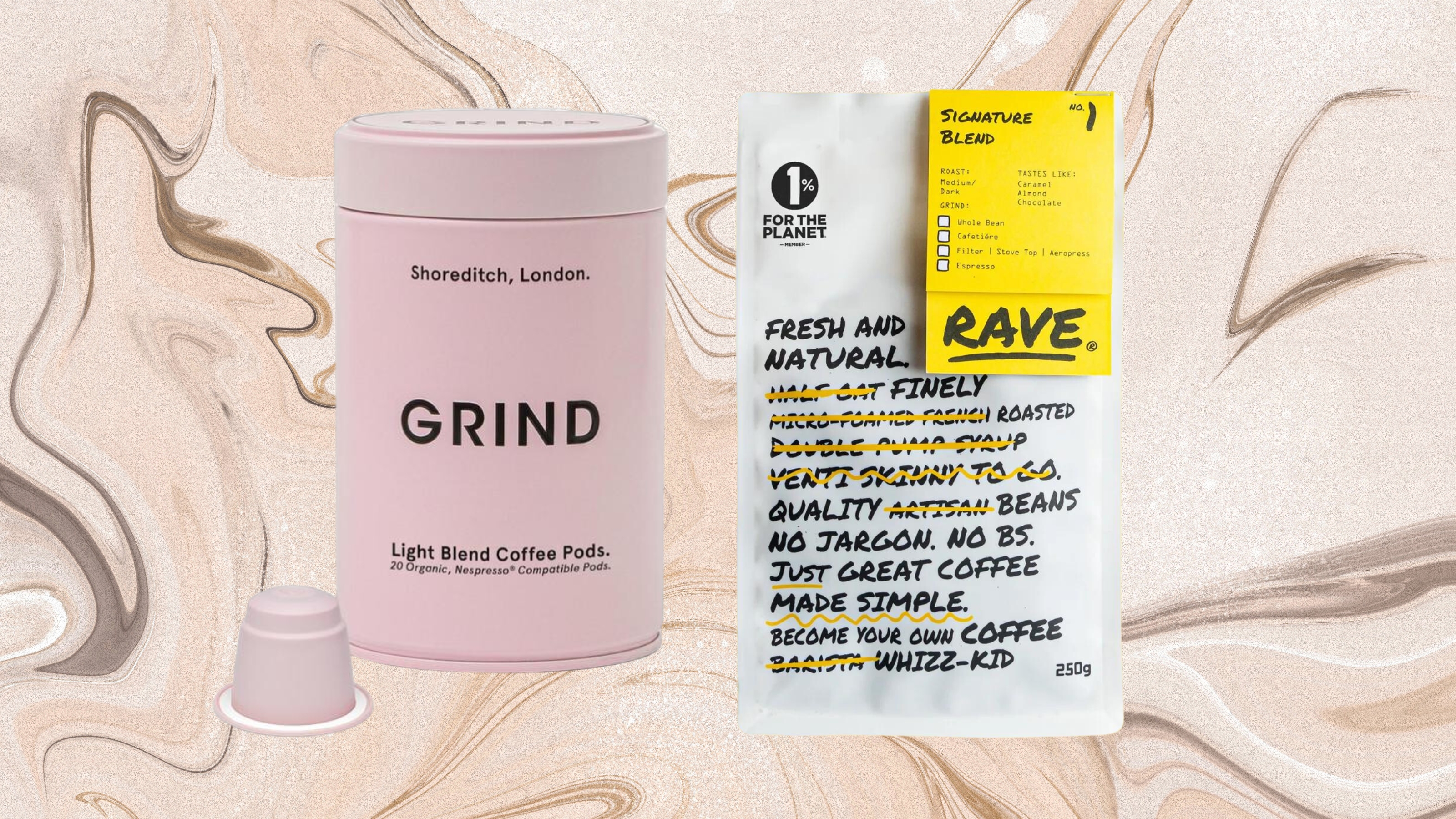Pods vs. ground coffee — what's the difference anyway?
Cheers to the weekend (and Monday mornings)


Get small space home decor ideas, celeb inspiration, DIY tips and more, straight to your inbox!
You are now subscribed
Your newsletter sign-up was successful
Pods vs. ground coffee? Where do you stand on the caffeine-related pendulum? Taste, time, and cost all come into account when you're judging the different types of coffee. But which is your mode d'emploi on morning coffee break? And, after reading this guide — will you be tempted to shake things up?
We'll go over which is speedier to make, the one that wins the flavor test, and how much you should expect to pay for each. You'll be pleased to know that you don't even need a coffee maker for one of them. Spoiler: It's the ground coffee. One thing's for certain. Both give you an energy boost (it's my pre-workout essential) and are a great excuse to invite friends and family over. But whichever you use, make sure you drink your coffee in style with one of our best coffee mugs.
Quick menu
Pros and cons of pod coffee
Pros and cons of ground coffee
Quality of coffee and taste
Equipment needed
Cleaning
Storage and longevity
Where to buy coffee pods
Where to buy ground coffee
FAQs
Pros and cons of pod coffee
Pros
- Consistent quality and taste
- No barista experience necessary to tamp ground coffee
- Stays fresher for longer
- Time-efficient to use
- Easy to transport on vacation
Cons:
- Upfront costs of pod coffee maker
- Strength can't be altered
- Some pods aren't recyclable
- Some pods are specific to machine type
- Sometimes more expensive than ground coffee
Pros and cons of ground coffee
Pros
- Freshly ground coffee has a stronger aroma and tastes better
- Freshly ground coffee is full of antioxidants
- Better mouthfeel and consistency (because of the natural oils present)
- Coarseness/grind size can be customized for French Press, percolators, flat-bottomed drip coffee makers, and Moka coffee makers.
1. Quality of coffee and taste
I personally have a great relationship with my local coffee roasters. And although I own one of the best bean-to-cup coffee machines (read my Breville Barista Max coffee maker review), I sometimes still buy the pre-ground stuff, to remove one step from my coffee-making process. You see it's far quicker (and less noisy) *not* to use the built-in grinder when I want my go-go juice.
Get small space home decor ideas, celeb inspiration, DIY tips and more, straight to your inbox!
They take their job super seriously, so always stamp the date they roasted and ground the beans on the packet, as well as let me know which country the li'l coffee cherries came from (and the apparent tasting notes of caramel, chocolate, and red fruit). My coffee-roasting friends will often advise that I use the product within one month of the date on the pack. Easy!
When I've bought pods in the supermarket (to test the best pod coffee makers), I seldom have this knowledge (including how long it's been stacked, slowly going stale). NGL, I also don't have that same rapport with the staff in the supermarket as they pass through my items on the conveyor belt.
"For coffee aficionados, the aroma and taste of freshly ground beans are unparalleled," says Chris Diamantakis, co-founder of Pure Joy Coffee. "Grinding coffee beans releases their natural oils and preserves the flavor profiles, resulting in a more nuanced and aromatic cup of coffee."
"Ground coffee also allows for customization, as you can adjust the grind size and experiment with different brewing methods to extract the perfect flavors that suit your palate."
Winner: Ground coffee (IMO)
2. Equipment needed
We've all used ground coffee before. But, when I asked the team what their definition of coffee grounds was, some of us were divided on #brewgate.
Ground coffee (to most people) is essentially roasted beans that have been macerated with the best coffee grinder (either at home, at your local coffee house, or pre-processed in the way by the food manufacturer). From here on, depending on the coarseness, you can use it in a bean-to-cup machine, drip filter coffee maker, or use a French press to make your cup of joe.
Instant coffee on the other hand is described as freeze-dried soluble coffee with finely ground roasted coffee. To make it, you'll add 1 teaspoon (0.06 oz) to 6.5 fluid ounces of boiling water (drawn from your best tea kettle).
Whereas coffee capsules require a pod coffee maker that you insert the cap into. Pod coffee makers don't require pre-boiled water. They will bring your H2O to temperature, then extract the coffee in a matter of minutes.
"Pod coffee machines have revolutionized the way many people brew their morning pick-me-up. Offering speed, simplicity, and minimal cleanup, they have become a staple in countless kitchens," Diamantakis says.
"With just a push of a button, you can have a steaming cup of coffee in seconds. Pods also eliminate the need for grinding beans and measuring proportions, making them a time-saving solution for busy individuals."
3. Cleaning pods vs. disposing of ground coffee
All good things come with a little tidying up. Parties, fancy dinners and, unfortunately making a cup of coffee. These days, however, manufacturers are conscious of their responsibilities after they've handed over the goods.
When it comes to the latest coffee pods, most brands have cleaned up their (socio-environmental) act and created aluminum cases that can be discarded with the rest of your recycling. In many cases, you'll need to give the cartridge a rinse to get rid of any coffee residue, then dispose of it with your paper, card, and other reusable goods.
Wet ground coffee gives me the ick, but needs to be cleaned out of your cafetiere, filter coffee machine, or out of the group head of your fancy small coffee maker. Sometimes it's as easy as removing the paper filter and giving everything a wipe down, but cleaning a coffee machine can be a thankless task at times. Just don't make these coffee machine cleaning mistakes and you're all good!
On the plus side, spent coffee grounds can be used to clean your kitchen and to help keep your garden looking great.
Winner: Pods
4. Storage and longevity
OK, so I may have given pods a bad rap for being on the shelf. But actually, brands are getting better at sealing the flavors into metal canisters. Yes, you can buy spendy ground coffee from a bougie boutique store — but if you're not storing it properly when you get home, it's money poured down the drain.
Improperly-stored ground coffee can lose its flavor quickly, and the natural oils can turn rancid (gross) if it's had too much contact with air (aka oxidation). If you're super serious about coffee, invest in the ZWILLING Fresh & Save Handheld Vacuum Sealer Machine for Easy Storage (available on Amazon), and don't forget the Food Vacuum Seal Roll. This will keep air and contaminants out of your coffee, which will make it last longer.
Pod coffee storage has taken off on TikTok with content creators demonstrating how they display their coffee discs for all to see (and choose from).
Winner: Pods
5. Sustainability
Being the true expert, we asked Diamantakis to weigh in on the sustainability debate. Because, as much as we love drinking coffee, he knows about the ins and outs of the mighty bean, including the logistics required to bring you your long black.
He says: "Pod coffee machines often come with a wide array of flavors and blends to choose from, providing a convenient way to explore different taste profiles without purchasing multiple bags of coffee."
"However, this convenience comes at a cost, as most coffee pods are made of plastic or aluminum, contributing to environmental waste. On the other hand, opting for ground coffee allows you to choose sustainable options, such as locally sourced, fair trade, or organic beans, promoting both environmental consciousness and supporting ethical practices."
Winner: Ground coffee
6. Cost
"When it comes to cost, the debate between pod and ground coffee can be complex," explains Diamantakis.
"Realistically, pod coffee machines end up being more expensive due to the ongoing cost of purchasing coffee pods. Conversely, ground coffee offers a more economical solution, as buying whole beans and grinding them at home tends to be cheaper in the long run. Additionally, purchasing coffee in bulk often presents cost-saving opportunities for ground coffee lovers."
Winner: Ground coffee
The overall verdict
Diamantakis sums it up perfectly, so we're gonna pass the mic cup over to him to share his final thoughts.
"In the end, choosing between pod coffee and ground coffee boils down to personal preferences and priorities. If convenience and speed are paramount, pod coffee machines provide a quick and hassle-free brewing experience," he says.
"On the other hand, if you value the intricacies of flavor, customization, and sustainability, then the ritual of grinding your own beans and brewing with precision may be the way to go. Ultimately, the perfect cup of coffee is subjective, and exploring both options can help you uncover your preferred coffee experience."
Where to buy pod coffee
I had a feeling you were thinking this, so I did my homework and drafted up a li'l piece on where to buy Nespresso pods online.
Where to buy ground coffee
Personally, I like to frequent local Indie stores on the hunt for good coffee. But if you aren't as lucky (or don't enjoy this IRL experience), here's where you can get your hands on ground coffee. In my humble opinion, it's better to buy whole beans and grind what you need at home, but for convenience, get pre-ground coffee.
Stores that sell ground coffee
FAQs
Are coffee pods as good as ground coffee?
While the freshness factor might not be there, coffee pods are great if you want a reliable and consistent cup of coffee every time. Unless you use weighing scales with your ground coffee, you'll know the pod contains the same amount of per use. Pod coffee machines are often programmed to heat the water to the correct temperature without scalding the coffee, whereas boiling water straight from the kettle might make your coffee taste bitter.

Hi, I'm the former acting head ecommerce editor at Real Homes. Prior to working for the Future plc family, I've worked on a number of consumer events including the Ideal Home Show, Grand Designs Live, and Good Homes Magazine. With a first class degree from Keele University, and a plethora of experience in digital marketing, editorial, and social media, I have an eye for what should be in your shopping basket and have gone through the internal customer advisor accreditation process.